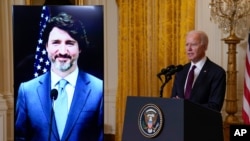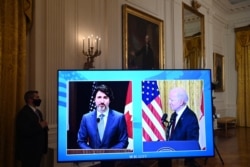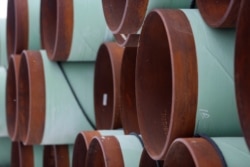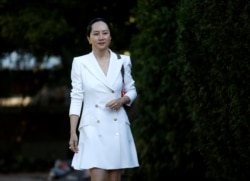The United States and Canada have agreed to “double down" on efforts “to achieve net zero emissions by 2050,” President Joe Biden announced on Tuesday, following his first bilateral meeting with a foreign leader since taking office last month.
Due to coronavirus pandemic precautions, his discussion with Canadian Prime Minister Justin Trudeau was virtual — with Biden in the White House in Washington, D.C., and the Canadian leader in Ottawa. Usually, Canada is a quick first stop abroad for any newly elected U.S. president, but COVID-19 turned the bilateral meeting into one with considerable social distancing.
The two leaders, however, appeared mostly in sync even if they were 700 kilometers apart.
Trudeau, whose image and voice were piped into the Oval Office, said that “U.S. leadership has been sorely missed over the past years,” specifically on addressing climate change — a criticism of former President Donald Trump’s four years in power when the United States pursued an “America First” agenda, neglecting alliances and multilateral relationships.
“As we’re preparing the joint rollout and communique from this one, it’s nice when the Americans aren’t pulling out all references to climate change and, instead, adding them in,” Trudeau said.
Biden told the Canadian leader during their virtual meeting that “the United States has no closer friend than Canada. That’s why you were my first call as president, my first bilateral meeting. … We’re all best served when the United States and Canada work together and lead together in close coordination on a whole range of issues.”
Trump and Trudeau had a contentious relationship. When the prime minister complained to the president about tariffs slapped on Canadian steel and aluminum, ostensibly on grounds of U.S. national security, Trump called Trudeau “very dishonest and weak.” Trump even raised the War of 1812, asking Trudeau: “Didn’t you guys burn down the White House?” (They didn’t; Canada was still a British colony in 1814 when troops that had come from across the Atlantic burned it.)
Despite the vastly improved relationship for the North American neighbors, there are unresolved disagreements.
In a move that “disappointed” Trudeau, Biden recently blocked the $8 billion Keystone XL pipeline project to pump oil from Canada to the United States. He also signed a "Buy American" executive order that hurt Canada by redirecting more government purchasing to domestic manufacturers.
White House spokesperson Jen Psaki said earlier Tuesday that no changes were anticipated in Biden’s position on the Keystone issue during the meeting.
Neither leader made direct reference to the controversial pipeline during their public remarks on Tuesday.
“Canadian energy workers power homes on both sides of the border,” said Trudeau after Biden delivered remarks. “It goes to show that we're all better off for this partnership.”
Trudeau also wants Canada to be allowed to buy COVID-19 vaccines for its struggling vaccination program from a Pfizer manufacturing facility in the U.S. state of Michigan.
Trudeau first raised the issue during a phone conversation last month, Biden’s first with a foreign leader as president.
Psaki on Tuesday called any such permission premature as “our focus right now is getting shots in arms at home.”
Trudeau said he and Biden, in Tuesday’s discussions, had “discussed collaboration to beat COVID-19 — from keeping key supplies moving and supporting science and research to joint efforts through international institutions.”
Trudeau also thanked Biden for his support to apply pressure on Beijing for the release of two Canadians — former diplomat Michael Kovrig and businessman Michael Spavor.
The two men have been in detention in China since 2018 after Canada arrested on fraud charges Meng Wanzhou, a Chinese executive with Huawei Technologies. Meng is also the daughter of the telecommunications company’s founder.
Washington has pursued Meng’s extradition and the case remains pending in Canadian courts.
“Human beings are not bartering chips,” Biden declared. “You know, we're going to work together until we get their safe return."








